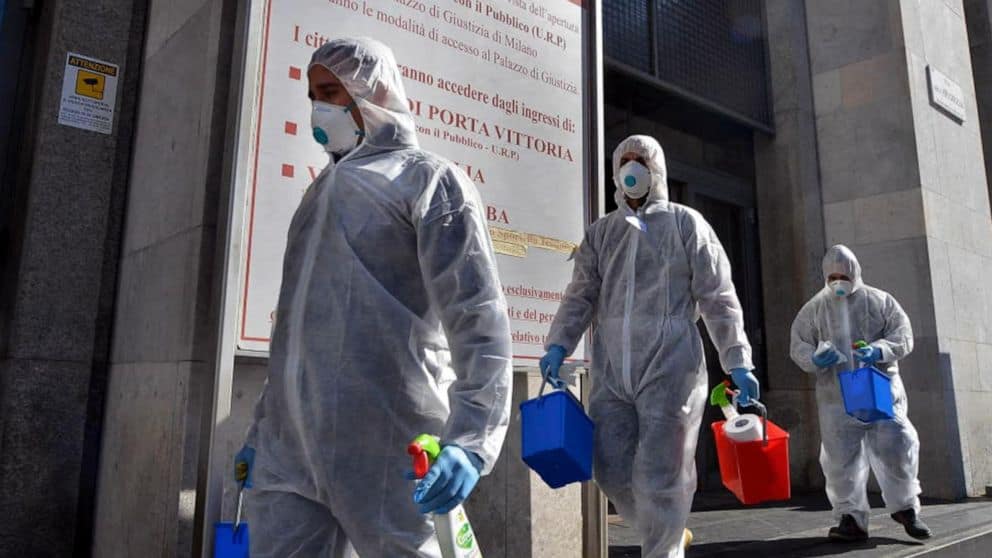“When COVID-19 arrived on the scene, it found a global capitalism that was sitting on a gigantic bubble of private debt that had been minted by central banks on behalf of financial capital,”Yanis Varoufakis, former Greek finance minister and economist and co-founder of the left-leaning Democracy in Europe movement (DiEM25) said.
Varoufakis became well-versed in economics in times of crisis. His spell in Greece’s government gave him first-hand experience of its debt crisis following the 2008 economic downturn.
Sharing his thoughts on the economic ramifications on the coronavirus pandemic, Varoufakis emphasized that the current economic crash is still part of the 2008 meltdown. “COVID-19 has pricked the bubble on which financial capitalism was sitting,” he warned, while highlighting that the EU’s capacity to combat the current economic fallout is extremely limited.
Europe’s fiscal policy, as outlined by President of the European Central Bank Christine Lagarde last week, intended to steady the nerves of the markets, but instead “failed spectacularly” Varoufakis said.
Lagarde signaled that the capital required to prop up markets had been spent in the post-2008 era, with the ECB’s current negative interest-rates unable to lower further. “It is at the end of its tether” Varoufakis explained, Lagarde “looked prime-ministers and presidents in the eye and said it’s your job now to borrow and spend”.
The latest Euro-group meeting stated that the pandemic poses a clear and present danger to recession in Europe, “the urgency was so great, that they decided to do absolutely nothing” the economist said to highlight European disunity and EU bureaucratic flaws.
The current crash and the 2018 solution
Varoufakis identifies two factors that led to recovery in 2008. The US central bank, the Federal Reserve extended dollar swap-lines, effectively giving dollars to foreign governments to cover losses. This activity, combined with strong economic performance in China had provided the foundation for recovery. The two factors allowed the IMF and central banks in Europe to shift “gigantic amounts of losses of private banks onto the shoulders of the weakest taxpayers,” which Varoufakis called “Socialism for the very very few and harsh austerity for the many”.
Both pillars of the 2008 recovery today are highly depleted, according to the economist. China is in no position to produce an economic boom, with its economy impacted by the Chinese COVID-19 outbreak and a severe slump in global demand.
The Federal Reserve could again offer dollar swap-lines to foreign governments, but the Trump administration might be less likely to support foreign governments, and might try to attach strings to support which could lead to “an even deeper recession” that would impact the entire world according to Varoufakis.
Structural problems
Varoufakis also admonished the decade-long move towards private healthcare. Private healthcare during this crisis resembles “rats leaving the ship,” according to the economist, who highlights how private healthcare providers have been pushing COVID-19 care to public health services. Having made healthcare ‘efficient’ over the years means there are few spare hospital beds or medical staff available in times of emergency.
Varoufakis has little trust in policy-makers’ ability to address the crisis. “The European Union has never been less competent than it is now, the European Union has never been less capable of acting as a union,” he noted. He sees the ease with which the markets collapsed in the face of the pandemic as evidence of deeper issues. According to Varoufakis, the inability of EU countries to deal with problems unilaterally has strengthened nationalism and encouraged people like Boris Johnson.
The economist said an insistence on austerity-based policies has weakened the possibility of any practical recovery , the economist hopes that through the movement he co-founded he is hoping to provide proposals that could have a ‘real’ impact.
The former economic minister sees the only way out of this crisis in massive investments in green technology and ‘green jobs’ and a significantly different way of approaching politics in Europe.

